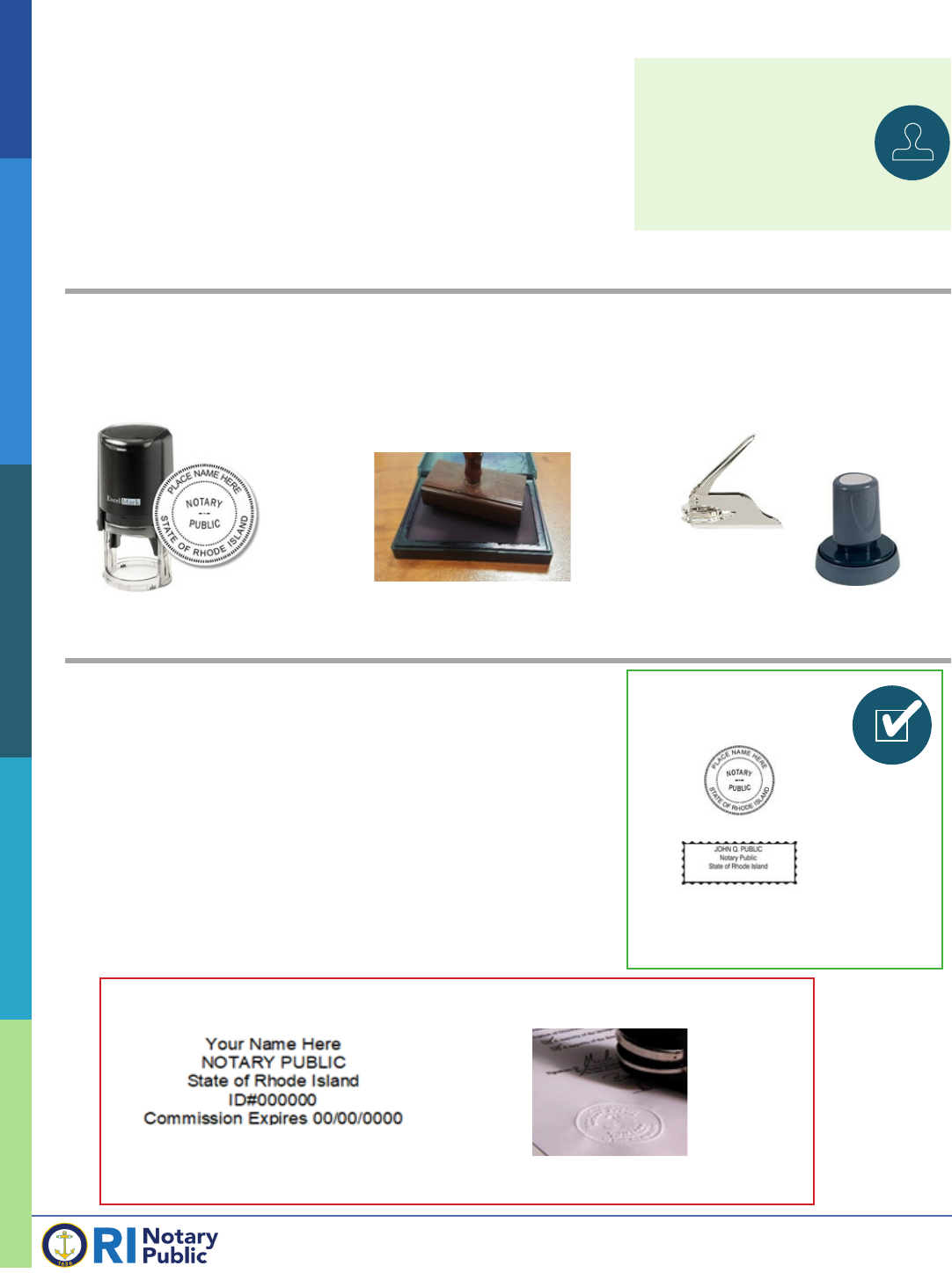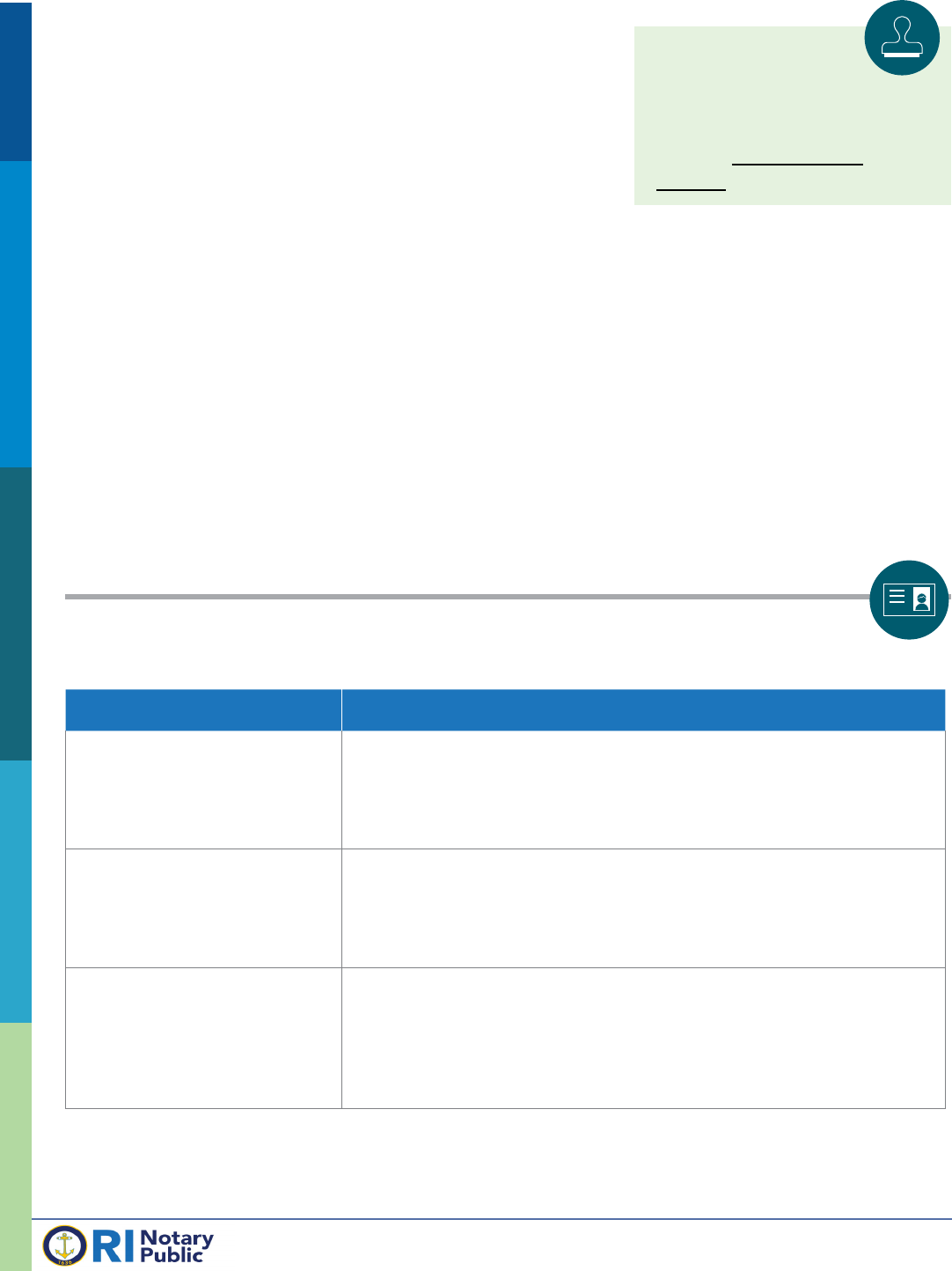
Quick Reference
Guide for RI Notaries
Public

DEAR NOTARY PUBLIC,
As your Secretary of State, I am committed to
providing the tools necessary for you to succeed
in your service as a Rhode Island Notary Public.
Our notary program oers easy-to-use educational
resources for new and seasoned notaries alike,
including the RI Notary Public Manual, Standards
of Conduct, video library, topical guides and
weekly live notary training, all at no cost. As part
of the continued eort to provide comprehensive
educational tools for RI notaries, we have
created this reference guide which includes
the following helpful materials to assist you in
fullling the duties of your notary commission:
• Your Notary Stamp
• Your Notary Journal
• Identifying Your Signer
• Identifying the 5 Main Notarial Acts
• Notarizing in Unique Circumstances
• RI Notary Public FAQs
In addition to these resources, our notary website
(www.sos.ri.gov/Divisions/NotaryPublic) is available
24/7 to ensure you always feel supported in using your
commission properly.
Thank you for your service to the people of Rhode
Island. I wish you all the best.
Sincerely,
Gregg M. Amore
Secretary of State
THANK YOU
FOR YOUR
SERVICE AS A
RHODE ISLAND
NOTARY PUBLIC!
401.222.3040
sos.ri.gov
@RISecState
CONTACT
RI Department of State
148 W. River St.
Providence, RI 02904
Monday through Friday
8:30 am – 4:30 pm.
ADDRESS
Register here for notary
training!

The RI Department of State
does not provide notary
stamps. You can purchase
a notary stamp at any oce
supply store or online.
AVAILABLE DEVICES
STAMP REQUIREMENTS
ACCEPTABLE
NOT ACCEPTABLE NOT ACCEPTABLE
SELF-INKING STAMP
RUBBER STAMP
WITH INK PAD
EMBOSSER WITH PRE-
INKED SEAL HIGHLIGHTER
• Be inked or be capable of being inked with a dark-color ink;
• Be round or rectangular;
• Include an edge border;
• Contain your name exactly as it appears on your commission;
• Contain the words “Notary Public;” and
• Contain the words “Rhode Island.”
Your Notary Stamp
Meets all requirements
Embossed seal is not ink highlightedNo border
RI Notaries Public must always use an inked
notary stamp when performing notarial acts.

Your Notary Journal
A notary journal is not required
by law; however, it is strongly
suggested that you use
one. A notary journal can be
purchased at any oce supply
store or online.
A journal allows a notary to record information about a notarial ceremony in real time,
including:
1. The date and time of the notarial act;
2. The type of document involved in the transaction;
3. The type of notarial act performed;
4. The name and address of the signer and witnesses, if applicable;
5. The signature of the person(s) who signed the document;
6. A description of the method used to identify the signer(s);
7. The fee, if any, charged by the notary; and
8. The reasons the notary did not complete or refused to perform a notarial act or
additional questions the notary asked the signer, if applicable.
• A notebook
• Copies of the signer’s documents or identication
• Used by anybody but the commissioned notary
A journal is a vital tool you can use for reference in
the event a complaint is led against you or you are
called to testify to the details of a notarial ceremony.
Notaries who use a journal of notarial acts should retain the journal for seven years.
Date & Time Type of
Document
Notarial
Act
Name and Address Signature Identication
Type
Fee Notes
January 1,
2022
Notary
Application
Oath of
Oce
Jane Doe
Jane Doe
RI Drivers
License
No Fee None
12:00pm 148 West River Street
Providence, RI 02904
1 2 3 4 5 6 7 8
A NOTARY JOURNAL SHOULD NOT BE:

RI Notaries Public are required to
screen signers to conrm their
identity, comprehension, and
intent. To positively identify your
signer, they must be physically in
your presence and bring with them
an original ID or qualifying credible
witness.
ACCEPTABLE FORMS OF IDENTIFICATION
• Driver’s license or identication card issued by the
RI Division of Motor Vehicles or by another state
or territory of the United States, Canada, or
Mexico;
• U.S. passport or a passport issued by a foreign
government; or
• Identication card issued by any branch of the
U.S. military.
All identication must be either current or expired not
more than three years.
Copies of identication are not acceptable.
USING A CREDIBLE WITNESS
If your signer does not have an ID that meets the criteria above, they may use a credible
witness. A credible witness must be someone who:
• Is personally known to the signer;
• Is physically in the room with the signer and notary;
• Is unaected by the document the signer wishes to have notarized; and
• Is willing to be placed under oath to swear that the signer is who they claim to be.
You will identify the qualifying credible witness using one of the acceptable forms of
identication listed above and place them under oath, asking them to swear to the signer’s
identity. Once the oath is administered, you may proceed with the notarial act as usual.
Be sure to capture both the signer’s and the credible witness’s signatures and detail how you
identied them in your notary journal.
Personal Knowledge
Being personally known DOES NOT mean you have known someone for an extensive amount
of time. It means that, at some point in your relationship with the signer, you have successfully
identied them using one of the types of identication listed above.
Identifying Your Signer
When reviewing a signer’s ID, you are looking for
two things: the photo on the ID looks like the person
standing before you and the signature on the ID
reasonably matches the signature on the document.

Anatomy of a Notarial Certicate
State of:
County of:
_________day of _______, 20___
______________________________________________
______________________________
___________________________
___________________________
Key:
1 - Venue
2 - Date when the notarization takes place
3 - Name of your signer(s)
4 - Key words indicating which notarial act to perform:
- acknowledgement
- subscribed and sworn to (jurat
- copy certication
5 - Inked notary stamp
6 - Notarial signature:
7 - Notary's printed name
8 - Notary's identication number
Date the notary's commission is set to expire
1
2
4
6
8

Identifying the 5 Main
Notarial Acts
During ALL notarial acts, the notary must screen the signer for identity,
comprehension, and intent. If a document does not indicate which
notorial act to perform, the signer must choose. As a notary you must
remain impartial and cannot inuence a signer’s decision. Below are
steps and tips to help you successfully perform the 5 main notorial acts.
The signer must always
personally appear on the
date and in the place you
indicate on the notarial
certicate.
ACKNOWLEDGMENT
The signer acknowledges that they have signed the
document for its intended purpose.
1) Review the document.
2) Identify the signer.
3) Have the signer verbally acknowledge their
signature is/was made willingly and competently.
4) Verify the signer’s signature.
5) Complete the notarial certicate and journal entry.
W o r d s t o l o o k f o r i n t h e n o t a r i a l c e r t i c a t e :
Acknowledge or Declare
JURAT
The signer swears under oath that everything in the
document is true.
1) Review the document.
2) Identify the signer.
3) Have the signer verbally acknowledge their
signature is being made willingly and competently.
4) Watch the signer sign the document and verify
their signature.
5) Adminster oath or armation aloud.
6) Complete the notarial certicate and journal entry.
Words to look for in the notarial certicate:
Subscribed and sworn to
The oath taker verbally promises to tell the truth.
1) Identify the oath taker.
2) Adminster oath or armation aloud.
3) Complete the journal entry.
Words for the Oath or Armation:
“Do you swear to tell the truth, whole truth, and
nothing but the truth [so help you God] or [on your
personal honor]?”
COPY CERTIFICATION
The notary certies the copy they made is a true and
accurate copy.
1) Verify the document is one that a RI notary may
lawfully copy and certify.
2) Personally photocopy or supervise the copying of the
document.
3) Compare the original document to the copy to verify it
is accurate and complete.
4) Complete the notarial certicate and journal entry.
Words to look for in the notarial certicate:
True, exact, complete and unaltered copy
SIGNATURE WITNESSING
The signer signs the document in the presence of the
notary.
1) Review the document.
2) Identify the signer.
3) Have the signer verbally acknowlege their
signature is being made willingly and competently.
4) Watch the signer sign the document and verify their
signature.
5) Complete the notarial certicate and journal entry.
W o r d s t o l o o k f o r i n t h e n o t a r i a l c e r t i c a t e :
Signed on the attached document in my presence
TIP: This is the only act for which a document can
come pre-signed.
TIP: A specic oath may be written on the document.
TIP: There is no notarial certicate for this act.
TIP: The document holder and the document owner do
not have to be the same person. The document owner
does not need to be present.
TIP: When a signer requests a signature witnessing,
they are simply establishing that they appeared before a
notary public on a certain date.
OATH/AFFIRMATION

For step-by-step
instructions on
performing notarizations
in these circumstances,
see the Notary Public
Manual.
Notarizing in Unique
Circumstances
IDENTIFYING SIGNER
PAGE 1 OF 2
To properly perform a notarial act, a RI Notary Public must carefully screen the
signer for three things:
• Identity (the signer is who they claim to be);
• Comprehension (the signer understands what they are signing); and
• Intent (the signer is acting of their own free will).
This requires physical presence of the signer, careful review of the signer’s
identication and an interactive conversation between the notary and signer.
Detailed below are several unique circumstances you may come across and tips on
how to ensure proper screening of identity, comprehension, and intent.
SCENARIO TIPS
SIGNER SIGNS BY MARK
A mark may be an “x,” a smiley face, or another icon in place of a traditional
scrawl signature. A person signing by mark must have two unaected
witnesses attend the notarial ceremony. The notary should indicate clearly
on the notarial certicate the name of the signer and names and addresses
of the two witnesses.
DOCUMENT WILL BE
SIGNED WITH A POWER
OF ATTORNEY
The person signing the document should sign with their name as “Attorney-
in-Fact” for the grantor, for example, “John Doe, attorney-in-fact for Betty
Smith.” It is recommended that notaries review a copy of the power
of attorney document to verify the signer’s authority; however, it is not
required by law.
SIGNER DOES NOT
MATCH ID PHOTO
Look carefully at both the photograph on the signer’s ID and at the person
standing before you. Sometimes, weight gain or loss, hairstyle choices, or
other physical changes may make it dicult to recognize the signer as the
person in the photo on their ID. By taking a close look, you will likely be
able to identify the signer using unchanging features such as the shape of
the eyes, ears, nose and mouth or identifying facial marks.

SCREENING FOR WILLINGNESS
AND COMPETENCY
CONCERNS ABOUT THE DOCUMENT
SCENARIO TIPS
SIGNER IS BLIND OR
ILLITERATE
The notary should read the entire document to the signer before performing
the notarial act to ensure the signer fully understands the contents of the
document. You may also wish to add language to the notarial certicate like
the following: “I further certify that I read the document to (name of signer)
prior to notarization.”
SIGNER IS DEAF
If the notary and signer can clearly communicate in sign language or
in writing, they may do so. Be sure to note in your journal how you
communicated with the signer.
SIGNER WHO DOES NOT
SPEAK ENGLISH
If the notary and signer can clearly communicate in another language, the
notarization can proceed as usual. If not, the notary or signer can obtain the
help of an interpreter. The notary should place the interpreter under oath
attesting that the translation is accurate. If using an interpreter, you should
add language to the notarial certicate like the following: “I certify that the
nature and eect of the document was translated for (name of signer) by
(name of interpreter) before notarization.” The notarial certicate should be
completed in English.
SCENARIO TIPS
THE DOCUMENT IS
FROM OUT OF STATE
As long as both the notary and the signer are physically in each other’s
presence in the State of Rhode Island, a RI notary can notarize documents
dealing with transactions in other states. The exception to this is if the
document specically requires the services of a notary from another state.
THE DOCUMENT IS IN A
FOREIGN LANGUAGE
A notary does not need to understand or swear to the truthfulness of the
contents of a document. As long as the signer understands the language
on the document and the notary can clearly communicate with the signer,
including reviewing their identication documents, the notarization can
proceed. The notarial certicate should be completed in English.
THE DOCUMENT IS A
WILL OR LIVING WILL
A document presented to a notary as a will should be notarized only if clear
instructions and the appropriate notarial certicates are provided to the
notary. Performing a notarial act on its own does not make a will “legal” or
“valid.” Non-attorney notaries cannot oer any advice regarding how a will
should be prepared or the legal eects of a will.
THE DOCUMENT IS A
TRANSLATION
When notarizing a translation, the document must be signed by the person
who provided the translation. The notary must place the signer under
oath to arm that the translation is accurate. If the notary translated the
document, that notary cannot also notarize the document.
PAGE 2 OF 2

RI Notary Public FAQs
The questions listed below are general questions you may have about being a RI notary
public. The RI Department of State also oers free notary training several times each
month. Visit the training calendar and register for a date convenient for you.
1. How should my notary stamp look and where do I get one?
The stamp must be round or rectangular with an edge border surrounding the required
elements of the stamp. The stamp must include the notary’s name exactly as it appears on
their commission, the words “Notary Public” and “Rhode Island.” The stamp must also be self-
inking or capable of being inked with a dark-color ink. You may purchase a stamp at an oce
supply retailer online or in-store.
2. Should I use a journal?
Rhode Island notaries are strongly encouraged to use a notary journal, but it is not required by
law. Many notaries nd that using a journal is a protective measure for themselves and a very
benecial tool when responding to a notary complaint or testifying to the details of a notarial
act they performed.
3. What forms of identication can I accept?
• Driver’s license or identication card issued by the RI Division of Motor Vehicles or by
another state or territory of the U.S., Canada, or Mexico;
• Valid passport issued by the U.S. Department of State or by a foreign government; or
• Identication card issued by any branch of the U.S. armed forces.
All identication must be either current or expired not more than three years and must be the
original document, not a copy.
4. How can a signer use a credible witness?
If a signer does not have an acceptable form of ID, they can choose to use a credible witness
to prove their identity. A credible witness must be:
• Personally known to the signer;
• Identied by the notary by an acceptable form of identication;
• Physically in the notary’s and signer’s presence at the time of notarization;
• An unbiased third party who has no interest in, or benet from, the transaction; and
• Placed under oath by the notary to swear that the signer’s identity is valid.
5. How do I update/change my information?
Complete the Notary Information Update Form and submit it to the RI Department of State
Notary Division. There is no fee to update your commission information. Notaries are required
to report changes to their notary commission within 10 days of the change, except for updates
to the notary’s status as an electronic notary, which must be reported within 5 days of the
change.
6. Can I still notarize a document if my commission expired?
Yes, a notary public may continue to use their commission for thirty (30) days after the date
on which their commission expires. Once 30 days have passed, you may no longer use your
commission until it is successfully renewed.
PAGE 1 OF 2

7. What do I do if I want to resign?
A notary may resign their commission at any time by notifying the RI Department of State,
Notary Division in writing by email to [email protected] or by mail to 148 W. River Street,
Providence, RI 02904.
8. Can I notarize for a relative?
No, a notary public cannot perform a notarial act for a spouse, domestic partner, parent,
guardian, child, or sibling, including in-law, step, or half relatives.
9. Can I charge a fee to notarize a document?
A RI notary public may charge a fee not to exceed $25 per document/notarization.
10. If I am a notary for my employer and leave the job, am I still a notary?
Yes, a notary public owns their commission, stamp, and journal regardless of whether their
employer paid for said commission and notary tools.
11. Can I notarize a document in another state using my RI notary commission?
No, RI notaries may not perform a notarial act anywhere outside of Rhode Island.
12. Can I refuse to notarize a document?
You should refuse to notarize a document if you cannot properly screen the signer for identity,
willingness, and competency, if the document contains information you know is false or
fraudulent, or if you are otherwise prohibited from performing a notarial act on the given
document. You should not refuse to notarize a document simply because you “don’t want to”
or are not sure how to perform your duties properly.
13. What is the dierence between an oath and armation?
An oath is a spoken pledge to a God or a higher power. An armation is a spoken pledge
made on the signer’s personal honor with no reference to a higher power. Either one can be
used in an oath or armation notarial ceremony.
14. Can I notarize a document from another state?
A RI notary can notarize any type of document unless the document specically says the
document must be notarized by a notary commissioned in a dierent jurisdiction.
15. What is a notarial certicate, and do I have to use one?
A notarial certicate is legally required wording that is a part of or attached to the
document that is being notarized and states the facts attested by the notary during a particular
notarial act, including:
• The place where the notarial act took place;
• When the notarial act took place;
• Which notarial act was performed;
• Who appeared before the notary; and
• Details about the notary’s commission, including the required inked notary stamp.
RI notaries must use a notarial certicate each time they perform a notarial act. Sample
Certicates are available for download and use at sos.ri.gov/Divisions/NotaryPublic/
NotarySupplies.
PAGE 2 OF 2
